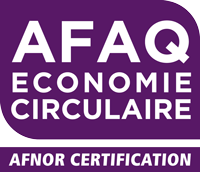-
SUSTAINABLE DEVELOPMENT
Closed-loop environmental solutions are vital when it comes to caring responsibly for our environment. Our vision is to reduce the use of fossil fuels to a minimum. To achieve this, we consistently rely on innovative production processes, efficient product geometry and recyclable materials. The success of SULO’s Circular Eco sustainability process is reflected in endorsements such as the Blue Angel ecolabel in Germany and the AFAQ certification for exemplary circular economy in France.
CONSISTENTLY CREATING A CLEAN AND LIVEABLE WORLD
Consistently saving resources
Reducing raw material consumption starts with using as little material as possible. Aiming at a controlled weight reduction our products are designed to use the right amount of material and energy while extending their service life. Our optimised ECO Design is groundbreaking in this area. Beyond that for more than twenty years the SULO Group has implemented and developed actions to repair or reuse all or part of our products in a circular economy approach applied to our service contracts. On a group scale, more than 500,000 spare parts are recovered, decontaminated and reused. Here too, carbon impact is very important, because these processes avoid production and logistic loops. The group’s expertise in maintaining and repairing in advance is recognized in all of the countries where our subsidiaries operate.
Consistently recycling
As a matter of principle, all of the components we use are fully recyclable, thus meeting the requirements of the closed recyclable material cycle. In 2019, the Langres plant became the first company in France to be audited and evaluated under the AFAQ Circular Economy standard for the production of bins made from 100 % recycled materials and bins containing at least 60 % material from selective household collection. For nearly 15 years, SULO has made the use of plastics from selective household collection its trademark. This expertise is unique. It allows us to manage the complexity and heterogeneity of waste intake. We can use up to ten different material sources in the manufacture of a bin that complies with the highest European quality standards (AFNOR, GGAWB). This way the industrial investments made at our production sites coupled with our engineers’ expertise enable our customers to implement the Circular Economy concept and limit their carbon impact.
Consistently minimising our CO2 footprint
In 2019 we committed ourself to a “measure, reduce, offset” approach concerning the carbon footprint of all our activities and emission factors. This will enable us to be in line with the Paris Agreement for our own emissions. In addition, we will continue our program to increase the amount of recycled material in all our products in order to enable our customers to limit their own emissions. The follwing measurements have enabled us to accomplish a relatively limited carbon footprint:
- Sustainable bin production
- Short-loop supply
- Optimized logistics
- Zero paper for maintenance
- Priority to preventive maintenance
Nothing is wasted
CITYBAC® bins are made for the collection of plastic waste, among other things. Therefore, CITYBAC® bins are part of the modern Circular Economy as a collection tool. In addition the HDPE of the CITYBAC® bins completely flows back into the production of new bins at the end of their lifecycle. SULO CITYBAC® bins made of recyclat are therefore the indispensable basis for the sustainable development of the future. CITYBAC® bins remain in the cycle - all CITYBAC bins are 100% recyclable. Nothing is lost, the cycle is completely closed. In this way, we reduce the consumption of fossil raw materials to a minimum. This is a documentable plus for the ecological effort of cities and municipalities to reduce their carbon footprint. Up to 85% post-consumer recyclate - in addition to the recycled bins, post-consumer recyclates like used bottles and packaging flow into the production of our RAL-certified bins. The share is at least 85%.Consistently optimizing our manufacturing processes
For the manufacturing of our bins, we use the latest injection molding techniques to optimize the material flow in the molds, allowing for shorter cycle times and lower energy consumption. This increases production efficiency while simultaneously guaranteeing the high-quality products for which SULO is renowned. All our industrial sites are certified according to the ISO 14001 standard, which obligates us to take the environment and biodiversity into account in all our activities. Moreover we are ISO 50001 certified, which aims at reducing energy consumption and greenhouse gas emissions. This standard allows us to increase energy efficiency, reduce costs, improve environmental performance and competitiveness. The Langres and Herford production sites have been certified since 2016 and 2014 respectively. Moreover we encourage the use of highly detailed energy consumption measurement kits to identify areas for reduction at our other industrial sites.
Consistently investing in sustainability
During the last years mayor investments have been made to support the transformation of the manufacturing base according to the requirements of Circular Economy. In 2019, approximately 5 % of the Group’s revenue was invested internally to make our production more ethical and more sustainable.
LED lighting in workshops for lower energy consumption in our German plants
- Optical sorting station and decontamination of recycled material to increase its use in particular by refining color sorting in Herford, Germany
- New rotational molding process to integrate 50 % recycled material into our Polyethylene collection banks at our production site in Chalon, France
- Secure station for oil reception and disposal in Herford, Germany
- New molds and presses that use less energy and resources in Germany and France

First AFAQ-certified French company
SULO is the first French company to be presented with the AFAQ Economie Circulaire ecolabel. The assessment is carried out in accordance with the XP X30-901 standard, which evaluates companies’ potential to manufacture products within a sustainable circular economy. SULO received this certification for two Circular Eco projects at the Langres production site:
- 100% recyclable bins made exclusively from recycled materials
- Integration of at least 60% post-consumer recycled materials (bottles, lids, etc.) when manufacturing high-strength plastics (HDPE)